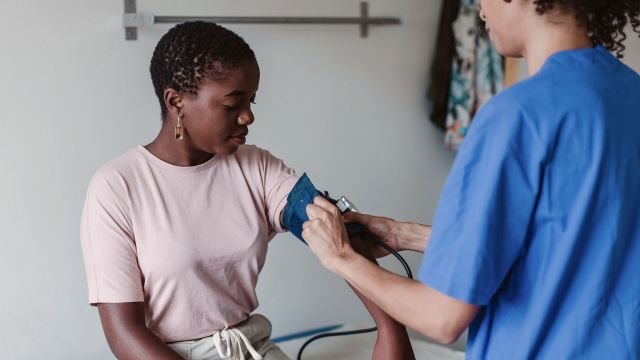Updated on May 2, 2024.
High blood pressure is also called hypertension. It is a heart condition that may not have any signs or symptoms. You may not know that you have it. But it can harm your heart. It can also damage your brain, kidneys, eyes, and other parts of your body.
High blood pressure affects about 120 million people in the United States. But many of them do not get help for it. This may for a few reasons:
- They may feel fine
- They may not know they need help
- They may not know how to get help
It is very important to treat high blood pressure. A blood pressure reading has two numbers:
- The top number (systolic)
- The bottom number (diastolic)
A normal blood pressure level is lower than 120/80 mm Hg. Anything above130 on the top or 80 on the bottom is considered high blood pressure.
Some things can temporarily affect your blood pressure during the day, including:
- The time of day. It is usually higher in the morning.
- The food you eat.
- If you do not drink enough water or other fluids.
- Stress or anxiety.
Certain things also increase your risk for high blood pressure, including:
- Age: Blood pressure tends to increase as people get older.
- Race: In the United States, Black people are at a greater risk for high blood pressure than other groups.
- Sex: Men or people assigned male at birth are more likely to have high blood pressure.
- Family history: High blood pressure runs in families. You may be more likely to get it if you have a close relative who has it.
High blood pressure can cause damage if it is not treated. This can include:
- Damage to arteries. These are the pathways that bring blood from the heart to other parts of the body.
- Fatty deposits called plaque can build up in the blood vessels. This makes them get hard. It can increase the risk for heart attacks, stroke, and other problems.
- Damage to the kidneys.
- Damage to the eyes. This can lead to double vision, headaches, or loss of vision.
There are ways you can help manage your blood pressure:
- Your healthcare provider (HCP) may tell you to take medicine to lower your blood pressure.
- Checking your blood pressure regularly. This can be done by your HCP. You can also learn how to do it at home.
- Eat less salt and eat more fruits and vegetables.
- Drink less alcohol or stop drinking alcohol.
- Exercise or be active most days of the week.
- Lose extra weight. Losing even a few pounds can help.
- Try to get 7 to 9 hours of sleep at night. This can also help you ease stress and lose extra weight.






